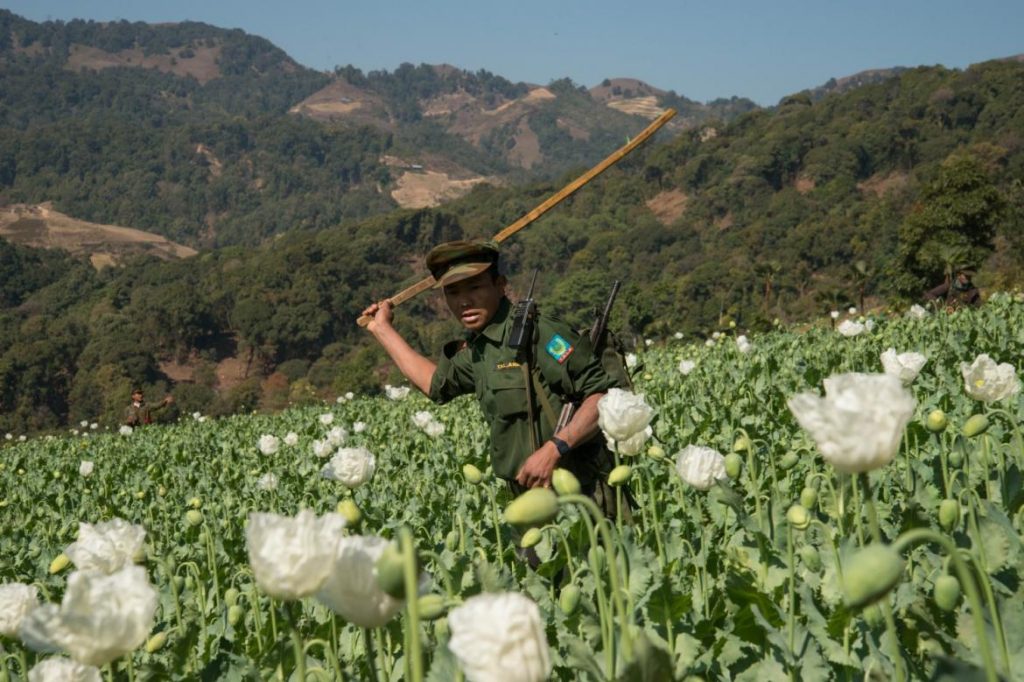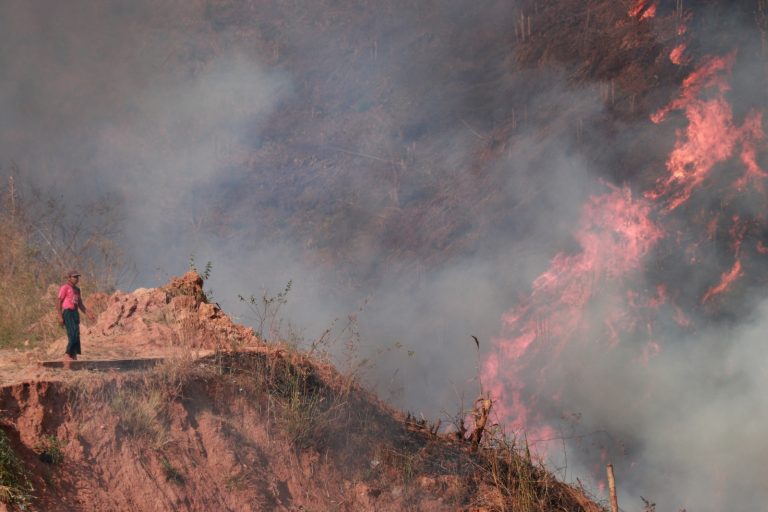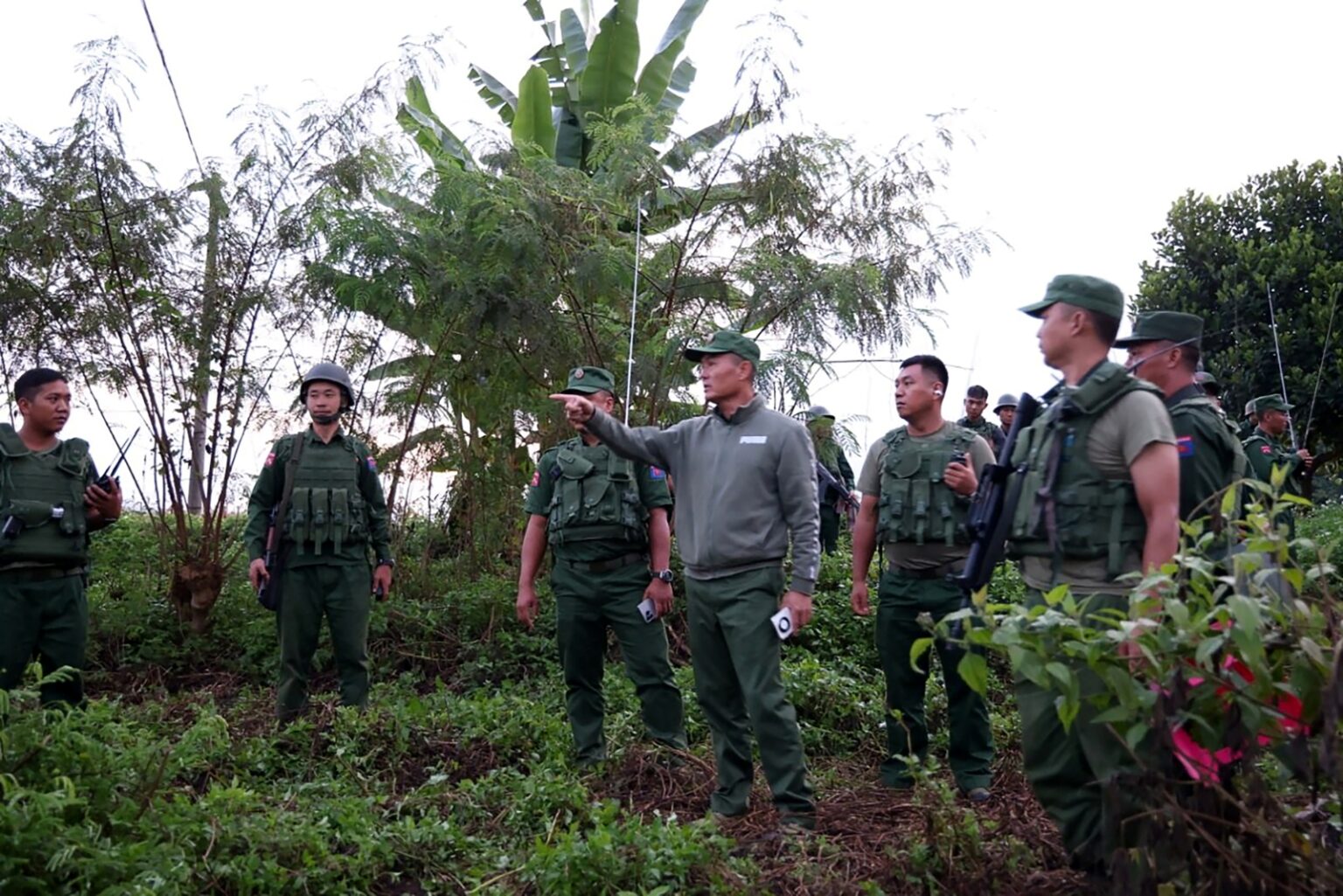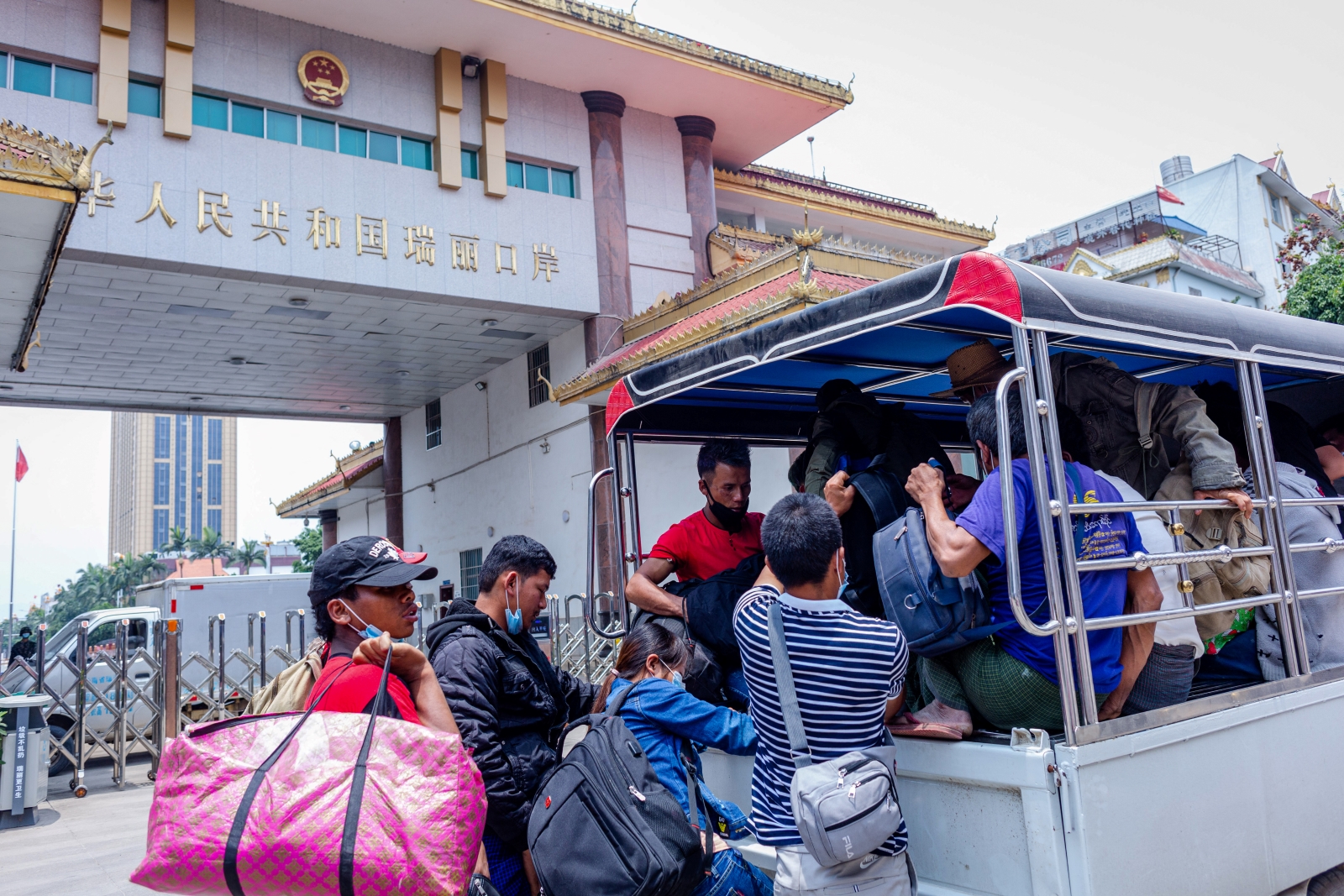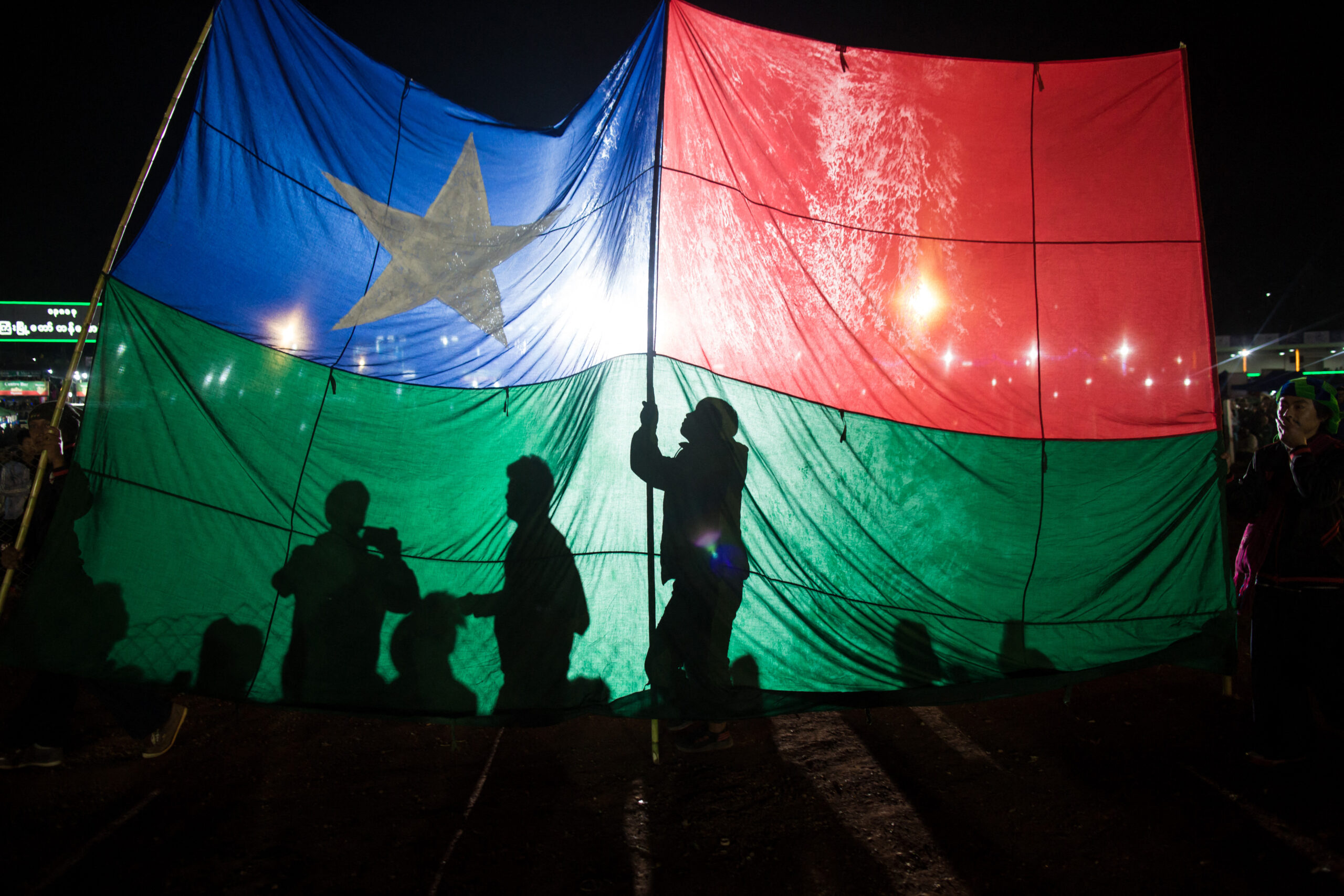An incident caught on film has put yet another spotlight on the human rights abuses accompanying the fighting in a major opium producing area of northern Shan State.
By NIELS LARSEN | FRONTIER
Social media has been buzzing recently over the post of a video allegedly showing members of the Tatmadaw and a militia group abusing villagers in northern Shan State.
A joint statement from the Ta’ang Student and Youth Organisation and the Ta’ang Women’s Organisation said the abuses occurred in the Ta’ang village of Say Kin in Namkham Township on December 23. The two groups said 11 civilians were arrested and tortured before being released, and property worth more than K300 million was stolen from the villagers.
The video, shared online late last month, provides grim evidence of the abuses being endured by villagers at the hands of the authorities since fighting began in northern Shan State in November.
The video shows members of the Tatmadaw’s Light Infantry Battalion 324 and the Pansay People’s Militia Force forcing the men of the village to undress and lay down before being beaten with sticks, walked on and threatened with machetes. (The video can be found on the Facebook page of the Palaung State Liberation Front. WARNING: Some viewers may find the footage distressing.)
Support more independent journalism like this. Sign up to be a Frontier member.
“This video is a stark demonstration of the culture of recreational sadism within the Burmese Army that has defined their counter-insurgency practice for decades,” said David Mathieson, senior researcher with the Asia division of New York-based Human Rights Watch.
The incident captured on the video is believed to have occurred during a counter-insurgency operation by the Tatmadaw and the militia to search for members of the Ta’ang National Liberation Army or its supporters in Say Kin.
The Ta’ang armed group believes the Sino-Burmese Pansay PMF is the root of all drug problems in the region and often dispatches troops on surprise raids to destroy poppy fields deep inside territory under the militia’s control.
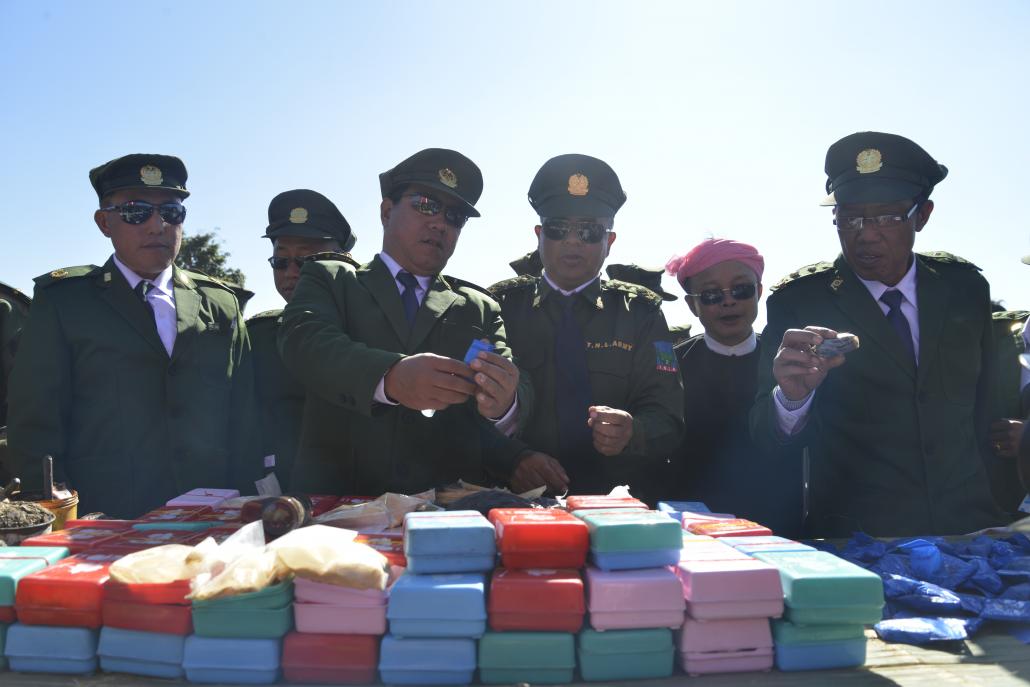
Members of the TNLA central committee inspect grade 4 heroin and yaba pills seized from Pansay militiamen. (Niels Larsen / Frontier)
The TNLA is among the groups that did not sign the so-called National Ceasefire Agreement with the government last October.
The role of people’s militia forces is to provide support and intelligence to the Tatmadaw in its campaigns against insurgent groups. In exchange, the PMFs are allowed to finance their operations by running businesses, mainly drug production, and engage in smuggling products such as timber.
The Pansay PMF, one of the largest in Shan, is the creation of U Kyaw Myint, a Han Chinese member of the Union Solidarity and Development Party who was re-elected to Namkham constituency (2) in the Shan State assembly last November.
U Kyaw Myint, whose Chinese name is Li Yongqiang, has various business interests in Namkham Township, which borders China’s Yunnan Province. They include most of the ferry crossings on the Shweli River and a casino near the bustling border trade town of Muse.
U Kyaw Myint and his estimated 300-strong militia rule over mountainous and deforested territory near the Chinese border where the cultivation of opium poppy is rife. Pansay PMF deserters and TNLA officers say underground facilities at the militia’s strategically-located headquarters contain heroin refineries and laboratories producing amphetamine-type stimulants such as yaba and ice. However, it is unclear if the facilities are operated by the militia or rented to Chinese crime syndicates.
In recent years, the Pansay PMF has been losing ground and personnel to the TNLA. The Ta’ang armed group believes the Sino-Burmese Pansay PMF is the root of all drug problems in the region and often dispatches troops on surprise raids to destroy poppy fields deep inside territory under the militia’s control.
The militia and Tatmadaw units dispatched to guard poppy fields have so far been unable to prevent these raids, which usually require several days and the deployment of government troops before a counter-attack can be launched.
The raids form part of a long-term drug eradication strategy by the TNLA, which also include forcibly putting drug users through “cold turkey” detoxification programs and jailing drug dealers without trial. The TNLA’s narcotics eradication policy made it greatly popular among the Ta’ang people, especially the women and the elderly, who were the first to suffer from widespread drug addiction. However, the TNLA’s popularity has waned since it began the forced conscription of one boy or girl from each family.
The militia has recently taken a proactive approach and launches patrols in collaboration with the Tatmadaw in the hope of capturing roaming TNLA units.
The patrols often become indiscriminate retaliation operations against Ta’ang civilians that result in the kinds of human rights abuses that were captured on the video.
The residents of an unnamed Ta’ang village near Say Kin allege that the Tatmadaw and Pansay militiamen used a knife heated on a fire to mutilate the face of the headman during a counter-insurgency operation in late October last year.
Speaking by phone on condition of anonymity, a member of one of the Ta’ang civil society groups that issued the statement said abuses of the population are frequent, although the incident at Say Kin village was unique because of the number of villagers involved.
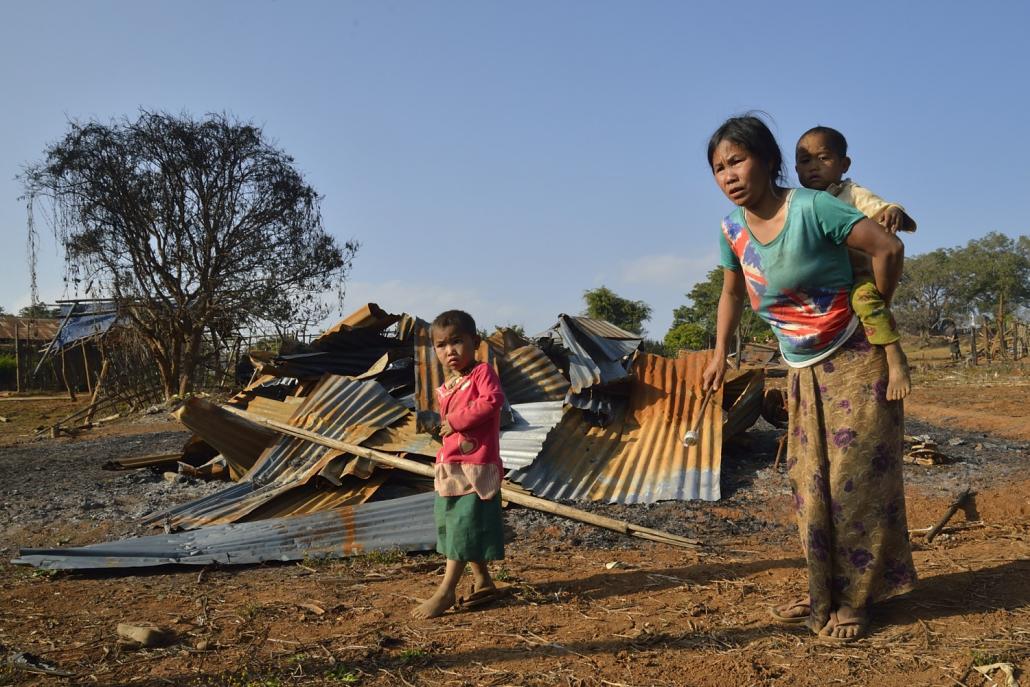
A woman and her two children in the village of Pankan, Kutkai township, in front of their flattened home. (Niels Larsen / Frontier)
RCSS reinforcements
Recently, the Pansay PMF has been receiving assistance from the Restoration Council of Shan State, which has its headquarters near the Thai border about 450 kilometres to the south, and is one of the eight groups that signed the NCA.
“The RCSS is new in the region, so they need the PMF to show them the terrain,” said a TNLA officer. The battalion has been discreet, the officer said, mingling with Pansay militiamen while in villages.
“We also have reports of a battalion of soldiers wearing Tatmadaw uniforms but only speaking Shan,” said Colonel Tar Bone Kyaw, secretary general of the TNLA. He said the Shan-speaking soldiers have been staying near Myanmar police and military bases for protection.
It seems that an alliance of convenience, facilitated by the Tatmadaw, has been forged between the Pansay PMF and the RCSS: The PMF needs better-trained troops to defend its lucrative but shrinking poppy fields and the RCSS needs local help to deploy its force in a new region. Being close to the border also has a business advantage for the RCSS should it decide to export drugs to China.
The three-way alliance among the Tatmadaw, Pansay PMF and RCSS was put to the test on February 12 when the TNLA’s battalions 101, 571 and 478 raided Pansay territory and destroyed poppy fields.
A few days later, a coordinated force of Tatmadaw, PMF and about 100 RCSS troops, backed by 105mm and 120mm mortars, tried to encircle the TNLA. On February 15, two jet fighters flew reconnaissance missions over the zone and a day later three Mi-35 Hind helicopter gunships attacked TNLA positions. Two TNLA soldiers were reported to have been lightly injured.
A TNLA officer said the use of Tatmadaw units to protect poppy fields was the result of local collusion between low-ranking Tatmadaw officers and the militia.
However, “any use of helicopter gunships or fixed-wing assets over the battlefield would almost certainly require authorisation at the level of the Northeast Command in Lashio,” said Anthony Davis, an analyst with IHS-Jane’s.
Mr Mathieson said “the torture and humiliation of civilians should be condemned from the highest level of the Burmese military and the personnel easily identifiable in the footage should be investigated and punished for their despicable treatment of these men”.
For the moment, it seems that the highest level of the Tatmadaw prefers to provide air support and reinforcements to protect a drug-trafficking militia ally.
For the residents of Say Kin, and other villagers affected by the failure of last year’s ceasefire accord to be inclusive, this is a cause for deep concern.
Title Photo: A TNLA soldier destroying opium poppy during a drug eradication campaign in Namhkam township. (Niels Larsen / Frontier)


